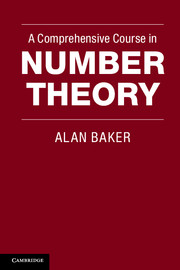Book contents
- Frontmatter
- Contents
- Preface
- Introduction
- 1 Divisibility
- 2 Arithmetical functions
- 3 Congruences
- 4 Quadratic residues
- 5 Quadratic forms
- 6 Diophantine approximation
- 7 Quadratic fields
- 8 Diophantine equations
- 9 Factorization and primality testing
- 10 Number fields
- 11 Ideals
- 12 Units and ideal classes
- 13 Analytic number theory
- 14 On the zeros of the zeta-function
- 15 On the distribution of the primes
- 16 The sieve and circle methods
- 17 Elliptic curves
- Bibliography
- Index
13 - Analytic number theory
Published online by Cambridge University Press: 05 November 2012
- Frontmatter
- Contents
- Preface
- Introduction
- 1 Divisibility
- 2 Arithmetical functions
- 3 Congruences
- 4 Quadratic residues
- 5 Quadratic forms
- 6 Diophantine approximation
- 7 Quadratic fields
- 8 Diophantine equations
- 9 Factorization and primality testing
- 10 Number fields
- 11 Ideals
- 12 Units and ideal classes
- 13 Analytic number theory
- 14 On the zeros of the zeta-function
- 15 On the distribution of the primes
- 16 The sieve and circle methods
- 17 Elliptic curves
- Bibliography
- Index
Summary
Introduction
Analytic number theory in its classical form is concerned with studies on the distribution of the primes. However, any technique that involves the application of mathematical analysis to the solution of number-theoretical problems can come under this heading. We have already introduced the subject in Sections 1.6 and 2.8. In particular we referred there to the prime-number theorem, to the Riemann zeta-function, to primes in arithmetical progressions and to sieve methods and their applications. This and subsequent chapters will be devoted to expanded accounts of these topics; we begin here with a brief history to help set them in context.
Euclid (c. 300 bc): existence of infinitely many primes.
Legendre (1788): asserted that every arithmetical progression a, a + q, a + 2q, … with (a, q) = 1 includes infinitely many primes. He gave no proof. Also conjectured (1808) that π(x), the number of primes ≤ x, is ‘approximately’ x/(log x − 1.08 …) so that π(x) log x/x → 1 as x → ∞.
Dirichlet (1839): established Legendre's assertion on arithmetical progressions; the work introduced L-functions, characters, class number formulae etc.
Information
- Type
- Chapter
- Information
- A Comprehensive Course in Number Theory , pp. 147 - 161Publisher: Cambridge University PressPrint publication year: 2012
